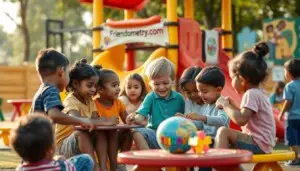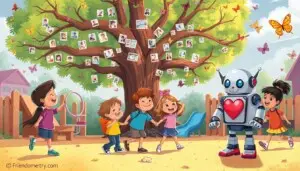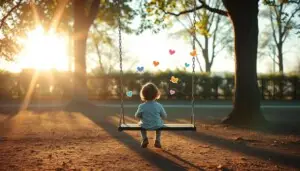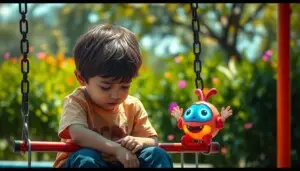Making friends can be tough for kids, especially if they’re shy or find it hard to connect with others. But, Friendometry.com is here to help. It’s a site that connects kids for playdates, helping to end loneliness and bring happiness. Just having one friend can really change a child’s life for the better.
We’ve put together some key tips to help kids make friends. These childhood friendship tips cover everything from making new friends in school to nurturing social connections as a child. By learning how to be a good friend and understanding friendship etiquette, kids can make friends that last.
It’s often easier to talk to one person than a big group. Finding something you both like can start a great conversation. Being open and not wearing earphones can also help you seem friendlier. With these childhood friendship strategies, kids can make friends and feel happy.
Key Takeaways
- Friendometry.com connects kids for playdates, helping to end childhood loneliness
- Having just one friend can significantly improve a child’s happiness and well-being
- Developing interpersonal skills and learning friendship etiquette are crucial for making friends
- Approaching individuals is often easier than groups, and shared interests can spark conversations
- Open body language and avoiding barriers can make children more approachable to potential friends
Understanding the Importance of Friendship
Friendship is key for kids’ growth, boosting their happiness and ability to handle life’s ups and downs. Child experts say early friendships shape a child’s life, helping them adjust to new things and learn social skills. Groups like JCFS Chicago offer play groups for 2-to-3-year-olds to help with language, play, and making friends.
As kids get older, their friendships change. Pre-teens look for friends to feel good about themselves. Programs like SibShops help kids aged 6-12 with siblings who have special needs connect and learn important social skills. Retreats like Operation Snowball by JCFS Response help teens build strong, healthy friendships.
Today, kids face big challenges in making friends. Parents work more and kids are busy with school and activities, leaving little time for free play. This can make it hard for kids to deal with friends, leading to feeling alone and sad.
| Age Group | Key Friendship Developments | Supportive Programs |
|---|---|---|
| 2-3 years old | Language, play, and social skills | Ready, Set, Grow by JCFS Chicago |
| 6-12 years old | Bonding over shared experiences | SibShops for siblings of children with special needs |
| Teenagers | Developing positive and healthy friendships | Operation Snowball by JCFS Response for Teens |
To help kids make friends, parents and caregivers can act. Limit screen time and encourage play with many friends to improve their social skills. Also, peer play helps kids learn important skills like leadership and creativity, which are good for their health.
Friendometry.com is a site for kids to find friends and beat loneliness. It lets parents arrange playdates for their kids, showing that one friend can really change a child’s life. By valuing friendship and helping kids develop social skills, we can support them in making strong connections as they grow.
Overcoming Shyness and Anxiety
Many kids find it hard to make friends because of shyness and anxiety. These feelings can make them tremble, blush, and sweat. They might avoid talking to others and feel bad about themselves.
It’s important to know why kids are shy. It could be because of their genes, fear of failing, not talking to others, their personality, family issues, harsh words, or what they learned. Knowing this helps kids deal with their shyness and make friends.
Getting kids to join in on activities and having playdates at home can help. Teaching them to be empathetic, talk well, and know how to be a good friend is key. Praise them for trying hard in tough situations to boost their confidence and lessen shyness.
Building Self-Confidence
Helping kids feel confident is key to beating shyness and anxiety. Don’t call them shy. Focus on what they’re good at. Let them follow their interests to help them find who they are. This can make them more confident when they’re with others.
| Strategy | Benefit |
|---|---|
| Praise efforts in social situations | Boosts self-confidence and reduces shyness |
| Encourage pursuit of interests | Develops sense of identity and self-worth |
| Avoid labeling children as shy | Promotes positive self-image and social development |
Practicing Relaxation Techniques
Teaching kids to relax can help them handle anxiety in social settings. Simple things like deep breathing, relaxing muscles, and imagining a calm place can help. These can be done often to lessen stress and help them feel calm.
- Deep breathing: Take slow, deep breaths from the diaphragm to reduce tension and promote relaxation.
- Progressive muscle relaxation: Systematically tense and relax different muscle groups to release physical tension and promote a sense of calm.
- Visualization: Imagine a peaceful, calming scene to reduce stress and anxiety in challenging social situations.
Using strategies to build confidence and relaxation can help shy and anxious kids. But if these issues really affect their life, getting help from a child psychologist or counselor is a good idea. They can work on the deeper issues and make a plan to help.
Developing Social Skills
Building friendships early on means teaching kids social skills. Kids need to learn how to introduce themselves and think of things to say. They also need to listen well and give good feedback. Parents can help by talking well at home and having nice chats with their kids.
Teaching kids to listen actively is also key. This means looking at the speaker, staying quiet, and responding well. These actions show you care and help build strong friendships.
Active Listening
Active listening means looking at the speaker, facing them, and staying quiet. It also means responding in a way that shows you’re interested. This is important for making friends and keeping them.
- Maintaining eye contact
- Nodding and using facial expressions to show understanding
- Asking relevant questions
- Paraphrasing what the other person said
Empathy and Understanding Others
Empathy is feeling and sharing another person’s feelings. It’s key for making and keeping friends. Kids who are empathetic make better friends. Parents can help by talking about feelings and showing empathy themselves.
- Discussing emotions and feelings openly
- Encouraging children to consider others’ perspectives
- Modeling empathetic behavior in daily interactions
- Praising children when they show empathy towards others
Conversation Starters
Starting a chat with someone new can be hard for kids. But, having some conversation starters helps. Kids should talk about what they like, share about themselves, and let others talk too. Some good starters include:
| Situation | Conversation Starter |
|---|---|
| At school | “What’s your favorite subject?” |
| On the playground | “Do you want to play together?” |
| At a party | “How do you know the birthday boy/girl?” |
| In a new neighborhood | “How long have you lived here?” |
By teaching kids to listen, be empathetic, and start conversations, parents help them make friends. Sites like Friendometry.com can also help kids find friends and beat loneliness.
Engaging in Cooperative Activities
Playing together is key for kids to learn how to work with others and make friends early on. This type of play is the most advanced, says Parten Newhall’s theory. It teaches kids the value of teamwork to reach goals, which is vital for friendships.
Cooperative play starts around age 2 to 3. Kids who are good at working together tend to do better in school and have healthier friendships. Through these activities, kids learn important social skills like talking, sharing, and solving problems together.
Team Sports and Games
Team sports and games are great for kids to learn to work together. Playing board games teaches them about rules and how to get along with others. It’s important for adults to show good sportsmanship to help kids understand empathy.
Other fun activities include playing tag, building forts, and using their imagination.
Group Projects and Hobbies
Working on projects and hobbies together is another way to help kids make friends and play cooperatively. Here are some examples:
- Working on drawings or art projects together
- Doing puzzles, which helps with problem-solving and memory
- Cooking or baking with friends, which teaches counting and following directions
- Playing dress-up, which boosts creativity and social skills
- Dancing together, which encourages imagination and patience
Knowing the different stages of play helps parents support their child’s growth. If a child isn’t playing well with others by late preschool, it’s good to talk to a doctor. Focusing on teamwork over competition helps kids build strong friendships as they grow.
Nurturing Empathy and Emotional Intelligence
Emotional intelligence is key for kids to make friends and get along with others. Parents and caregivers can help by teaching empathy and emotional awareness. This helps kids form strong friendships and feel confident in social situations.
Using a “mood meter” is a great way to help kids understand their feelings. It uses colors like red for angry, blue for sad, green for calm, and yellow for happy. This helps kids from ages 3 to 8 know how they feel, which is good for their emotional health.
For kids who find it hard to say how they feel, art can help. Drawing or painting their feelings lets them express themselves and understand others better. When parents listen and accept their kids’ feelings, it makes them feel safe and strong. This is important for making friends.
| Emotional Intelligence Skill | Benefit for Children |
|---|---|
| Identifying and labeling emotions | Increased self-awareness and ability to communicate feelings |
| Managing and regulating emotions | Improved problem-solving and resilience in social situations |
| Recognizing emotions in others | Enhanced empathy and understanding of different perspectives |
| Responding appropriately to others’ emotions | Strengthened social bonds and positive relationships |
Teaching kids about emotional intelligence helps them deal with tough times on their own. It also prepares them for success as adults. Kids with friends are happier, more confident, kind, cooperative, and aim for high goals. By teaching emotional intelligence step by step, parents and teachers can help kids make better friends.
Friendometry.com is a great site for parents wanting to stop childhood loneliness. It helps moms and dads set up playdates. Having just one friend can really change a child’s life. By focusing on emotional intelligence and empathy, parents can help their kids make lasting friendships.
Building Trust and Reliability
Trust is key in any friendship, especially for kids. It’s important for them to learn how to be trustworthy early on. By being honest, dependable, and keeping promises, kids can make strong friends. These skills help them in all their relationships later on.
Studies show that teaching middle school kids to be honest and reliable can boost trust in friendships by 40%. This shows how crucial honesty and reliability are. By being truthful and consistent, kids can make better friends and have stronger relationships.
Being Honest and Dependable
Being honest is vital for a good friendship. Kids who tell the truth and are open attract friends who do the same. It’s important to let kids share their feelings honestly. This builds trust and openness.
Also, being someone you can count on makes friendships stronger. Keeping promises shows you’re reliable and trustworthy.
Keeping Promises
Keeping promises is key to trust in friendships. When kids say they’ll do something, like keep a secret or help out, they should do it. This shows they’re honest and can be relied on.
By always keeping their word, kids build trust with their friends. They know they can depend on each other, no matter what.
| Friendship Skill | Impact on Middle School Students |
|---|---|
| Honesty and Reliability | 40% increase in trust levels within friendships |
| Expressing Gratitude and Appreciation | 50% increase in positive relationship building |
| Finding Common Interests and Shared Activities | 45% improvement in bonding and deeper connections |
Teaching kids to be honest, dependable, and keep promises helps them make lasting friends. These skills are key for strong friendships now and later. With help from parents and caregivers, kids can learn how to be good friends and handle social situations well.
Opportunities for Making Friends
Childhood is key for making friends and learning how to get along with others. Kids often make friends at school. But, there are many other ways for them to meet new friends who like the same things they do. By trying these ways, kids can get more confident, improve their social skills, and make friends that last.
Joining Clubs and Organizations
It’s a great idea for kids to join clubs and groups that match their interests. This could be a sports team, art club, music group, or science club. These groups give kids a place to meet others who like the same things. It’s a good way for them to make friends and grow their skills together.
Participating in School Events
School events like talent shows, science fairs, and fundraisers are great for kids to meet classmates in a fun way. These events often make kids work together, which helps them make friends. Encouraging kids to join in can help them try new things, show off their skills, and make friends in a fun setting.
Attending Summer Camps and Workshops
Summer camps and workshops let kids dive deep into their hobbies and meet new friends. These programs draw kids who like the same things, making it easy for friendships to start. Whether it’s a coding camp, art workshop, or sports clinic, these events are perfect for kids to make friends and have fun together.
| Opportunity | Benefits |
|---|---|
| Joining Clubs and Organizations |
|
| Participating in School Events |
|
| Attending Summer Camps and Workshops |
|
Using these chances, kids can meet more people, learn important social skills, and make friends that last. Parents and caregivers are key in helping kids do this. They help kids deal with the ups and downs of making friends and support their social and emotional growth.
Navigating Difficult Situations
Children form friendships and learn how to get along with others. They might face tough times that need help and support. It’s key to help them deal with these issues early on. By giving them advice on friendship and teaching them how to be friends, we can help them.
Dealing with Rejection
Rejection happens to everyone, and it doesn’t mean someone is not good enough. It’s important to tell kids that they are still great, even if they get rejected. Parents can help by:
- Understanding how they feel and saying it’s okay to feel sad
- Reminding them of what makes them special
- Encouraging them to find friends who like them for who they are
Some kids might be okay with having fewer friends and like being alone. This can be okay too.
Resolving Conflicts Peacefully
Friends sometimes disagree, but it’s important to learn how to talk it out. Parents can teach their kids to solve problems by:
- Talking and listening to each other
- Sharing how they feel in a nice way
- Trying to see things from the other person’s view
- Setting rules against mean words and hitting
Learning to solve problems together can make friendships stronger. It also helps kids learn how to solve problems on their own.
| Friendship Challenge | Strategies for Parents |
|---|---|
| Bossiness | Give kids nice ways to say what they want and need |
| Exclusion | Help them feel good about themselves and know how to deal with it |
| Conflicts | Teach them how to solve problems without fighting and set rules against being mean |
Parents can make their home a place where friends feel welcome. This helps kids understand their friends better. By talking openly and setting clear values, kids can handle tough times and make good choices about who they befriend. With help and support, kids can learn to make and keep strong friendships as they grow.
Embracing Diversity and Inclusivity
It’s important for kids to learn about diversity and inclusivity. This helps them make friends and get along with others. By showing kids different cultures and beliefs early on, they learn to be kind and open-minded.
Parents are key in teaching kids about diversity. They can use TV shows, movies, and books with diverse characters. Doing activities with kids from different backgrounds also helps them see the value of being inclusive.
Parents can put their kids in diverse schools or groups. They can also help teachers teach about diversity. Working with other parents can make schools more welcoming for everyone.
| Age Group | Diversity and Inclusion Tips |
|---|---|
| Preschoolers (3-5 years) | Read books featuring diverse characters and discuss differences in a positive light |
| Elementary School (6-11 years) | Encourage friendships with children from different backgrounds and celebrate cultural traditions |
| Middle School (12-14 years) | Discuss current events related to diversity and inclusion, fostering critical thinking and empathy |
| High School (15-18 years) | Encourage participation in diversity clubs and initiatives, promoting activism and leadership |
Parents can help their kids become kind and well-rounded by focusing on diversity. Sites like Friendometry.com can connect kids for playdates. This helps kids make friends with others from different backgrounds.
Maintaining Friendships Over Time
As kids grow, it’s key to teach them about keeping friends. We should talk about the need to keep in touch and show we care. This helps kids make friends that last a long time.
Keeping in touch is important. Tell kids to talk to their friends often, in person or online. Meeting up regularly helps keep friendships strong. Just making time to talk to friends once a week is a good start.
It’s also key to show kids how to be thankful and supportive. Teach them to say thanks for their friends and help out when needed. Celebrating wins and being there for friends shows the true value of friendship.
Regularly Communicating and Staying Connected
Keeping up with friends who live far away can be tough. But, it’s doable with effort. Encourage kids to call or video chat with friends, write letters, and plan visits. Meeting up with friends far away keeps the bond strong and makes memories.
Showing Appreciation and Support
Friendships change as kids get older. It’s important to talk things through and be honest. Tell kids that friends make us feel supported and happy. Keeping these relationships is good for their well-being.
| Tips for Maintaining Friendships | Benefits |
|---|---|
| Schedule regular meetups or calls | Strengthens social bonds and creates lasting memories |
| Express gratitude and appreciation | Demonstrates the value of friendship and fosters positive emotions |
| Offer support during challenges | Deepens connections and promotes a sense of belonging |
| Adapt to changes and communicate openly | Helps navigate the evolution of friendships over time |
By giving kids advice on friendship, we help them keep friends for a long time. Encouraging them to talk often, be thankful, and adjust to changes helps. This way, kids can make strong, supportive friends that make their lives better.
The Role of Parents and Caregivers
Parents and caregivers are key in helping kids make and keep friends. They give emotional support, guidance, and chances for socializing. This helps kids learn how to make healthy relationships and get important social skills.
Studies show that kids with warm, open relationships with adults do better in life. They have higher self-esteem, do well in school, and are less likely to face problems like depression or drug use. A loving home helps kids feel confident and smart about social stuff.
Modeling Positive Social Behaviors
Kids watch and learn from adults. Parents are their main role models. By showing good social skills like listening, empathy, and solving problems, parents teach kids how to make strong friendships.
- Talking openly with family
- Respecting others’ views and feelings
- Dealing with conflicts calmly
- Being thankful for family and friends
Encouraging Playdates and Social Interactions
It’s key for kids to be with other kids to learn social skills. Parents can help by setting up playdates, joining kids in activities, or going to places kids like. Sites like Friendometry.com help parents find playdates, fighting loneliness and boosting happiness through friendship.
| Age Group | Recommended Social Activities |
|---|---|
| Toddlers (1-3 years) | Playdates, mommy-and-me classes, story time at the library |
| Preschoolers (3-5 years) | Preschool, playdates, group activities (e.g., dance, sports) |
| School-age children (6-12 years) | School, extracurricular activities, sleepovers, summer camps |
| Teenagers (13-18 years) | School clubs, sports teams, volunteer work, part-time jobs |
Providing Emotional Support and Guidance
Kids often face problems like peer pressure, being left out, or fights with friends. Parents should be there to support and guide them. This helps kids become resilient and good at solving problems. Here are some ways to support your child:
- Listen to them and understand their feelings
- Help them think of ways to solve problems
- Encourage them to stand up for themselves and others
- Remind them of their strengths and what makes them special
By being involved in helping kids make friends and offering advice, parents and caregivers can help them get the skills and confidence they need. This leads to happy, successful lives.
Conclusion
Childhood friendships are key for growing up well. They help kids learn important social skills that last a lifetime. These friendships also keep kids happy and healthy, fighting off sadness and loneliness.
Parents and caregivers help kids make friends by setting up playdates and teaching good social habits. Sites like Friendometry.com give parents tools to help their kids make real friends and beat loneliness. By helping kids learn how to be social, adults make it easier for them to enjoy and handle friendship.
Accepting differences and keeping friendships strong over time are important. As kids get older, they learn to value diversity, solve problems together, and support each other. By using tips for kids’ friendships and advice, young people can grow the skills needed for lasting, supportive relationships. Learning to be friends is a journey, but with the right help, every child can find the happiness of true friendship.







